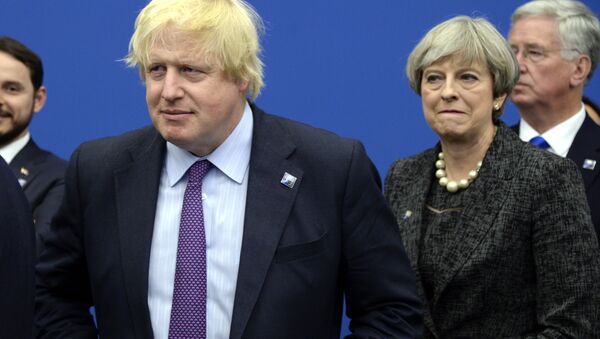UK Foreign Minister Boris Johnson has commented on the allegations of Russia's influence on the results of the country's long-disputed referendum on Brexit, saying that he had "seen no evidence" in his interview to the Sunday Times newspaper released ahead of the top diplomat's planned visit to Russia, due to start next week.
However, according to Johnson, "there has been Russian trolling on Facebook," in addition to "cyber-warfare, with attempted disruption of democratic processes in the UK."
Speaking about the relations with Moscow in his interview with The Sunday Times, Johnson described Russia as "closed, nasty, militaristic" country, comparing it to Sparta. At the same time, he noted that open and democratic Athens was "the analogue of the United States and the West."
Russian Foreign Ministry spokeswoman Maria Zakharova has commented on this words, calling them inappropriate, adding that "today's strife that has been sown and actively cultivated by the West, particularly on the European continent, certainly weaken the Western civilization itself and make it vulnerable to threats such as the Daesh".
The statements were made in the wake of the November 13 speech of UK Prime Miniter Theresa May, during which she accused Russia of meddling in other states' affairs, spreading "fake stories" in the media, aggressive policies" aimed at sowing discord in the West. A day after the speech, however, the prime minister explained that these claims weren't referring to the UK.
READ MORE: UK Anti-Russia Articles Caused by May's 'Banquet Speech,' Budget Debates
May insists on maintaining the European Union's united and "firm" position on Russia, while Moscow has repeatedly called all allegations concerning the country's alleged interference in EU affairs, voiced by Britain, France and Germany, "ridiculous", saying that the claims were aimed at diverting the public's attention away from an inability to solve domestic issues.
READ MORE: Russian Embassy Slams 'Unfounded Accusations' of Alleged Interference in Brexit
Syrian Issue
Boris Johnson has underlined the necessity of searching for issues of common ground with Moscow, naming the fight against terrorism as one of them.
"We have to be firm, we have to beware but we have to engage. Together we did defeat Nazism. We need to collaborate again to defeat Islamist terrorism."
The UK foreign secretary has revealed his plans to discuss Moscow's stance on the political settlement in Syria during his official visit.
"We need to talk to Russia about how they see the endgame in Syria. They have managed to maintain their client [Syrian President] Bashar al-Assad in power in Damascus but they have not produced a political solution for Syria. We are going to be pushing very hard to understand how the Russians see it [resolution] and to see how we can get some forward momentum there," Johnson said.
The minister's visit will precede the Syrian National Dialogue Congress, which is expected to take place in February and is being spearheaded by Russian President Vladimir Putin, to bring together a number of opposition and pro-government forces, as well as representatives of all Syria's ethnic and religious groups to push forward the process of political settlement in the country and address the issues of the future Syrian constitution.
The Syrian issue has recently entered into a new phase after the announcement of the defeat of the Daesh terrorist group (banned in Russia) on both banks of the Euphrates in Syria, followed by Putin's order to withdraw the main part of the Russian forces on December 4, with the bases in Hmeymim and Tartus to continue their operation.
The armed conflict between terrorist militants, government forces and opposition groups has been raging in Syria since March 2011, with Moscow launching a military operation in 2015 at the request of the Syrian president. Separately, the US-led coalition of over 70 nations, comprising the British forces, has been conducting a military campaign in Syria without the consent of the country's authorities or a UN mandate.
READ MORE: US, Russia Should Cooperate on Syria — Former US Ambassador




